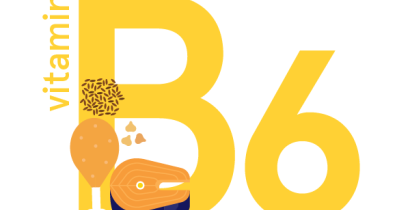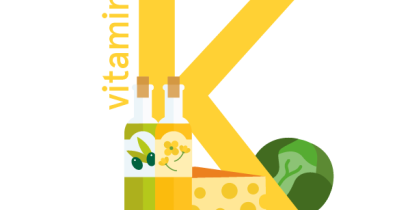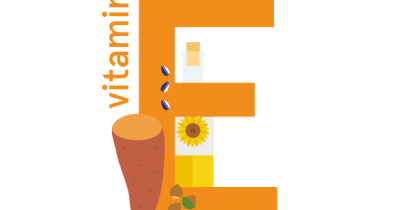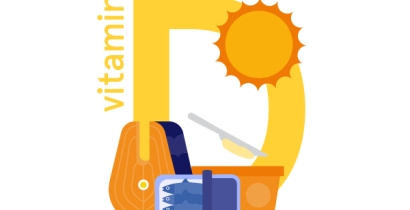Vitamin B12: foods, functions, how much do you need & more
Last Updated : 11 January 2021Have you recently looked into reducing your intake of animal products? If so, you might want to pay attention to vitamin B12!
What is vitamin B12?
Vitamin B12, also known as cobalamin, is the generic name used for a group water-soluble compounds that belong to the family of B-vitamins. We can find vitamin B12 mainly in animal-based foods and fortified products.
What are the functions of vitamin B12?
Vitamin B12 is needed in many important bodily processes, particularly to keep the healthy functioning of our brain and nervous system. Vitamin B12 works together with folate in many functions, including to create our genetic material (DNA and RNA), to form our red blood cells and to help break down an excess of homocysteine, an amino acid that can put us at higher risk of cardiovascular disease, when present in high amounts.
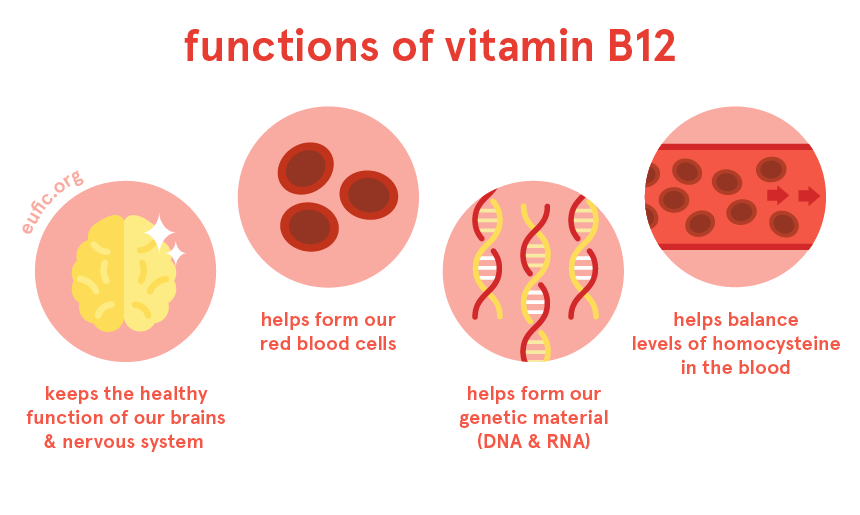
How much vitamin B12 do I need per day?
How much vitamin B12 you need per day changes according to your age, sex and life-stage.
The dietary reference value (DRV)* for healthy adults (over the age of 18) is 4 μg of vitamin B12 per day. During pregnancy and lactation, needs can go up to 4.5 μg and 5 μg of vitamin B12 per day, respectively.
Following your country's dietary guidelines on a healthy and balanced diet will help you meet your needs for vitamin B12. However, since we get vitamin B12 mainly from animal products and fortified foods; those who follow a vegan diet are often advised to supplement this vitamin.
If you are planning to change your diet, have recently done so, or are concerned that you might not be getting enough vitamin B12, we recommend that you consult a qualified nutritionist or dietitian to discuss how to best meet your own nutritional needs.
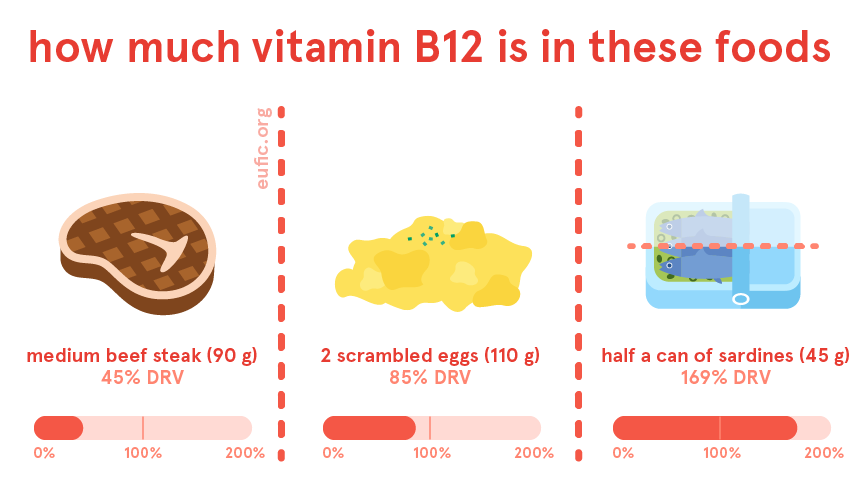
* These values are based on the adequate intake (AI) estimates from the European Food Safety Authority (EFSA). They should not be interpreted as nutrient goals. To know more about DRVs in Europe click here.
What foods contain vitamin B12?
Vitamin B12 is mainly found in animal products such as:
- meat
- fish
- eggs
- dairy products
- fortified foods (such as breakfast cereals and plant-based alternatives to yogurt and milk).
Yeast is also a rich source of vitamin B12, but contrary to misconceptions, it doesn’t really increase our vitamin B12 intake, since we only eat it in very small amounts.
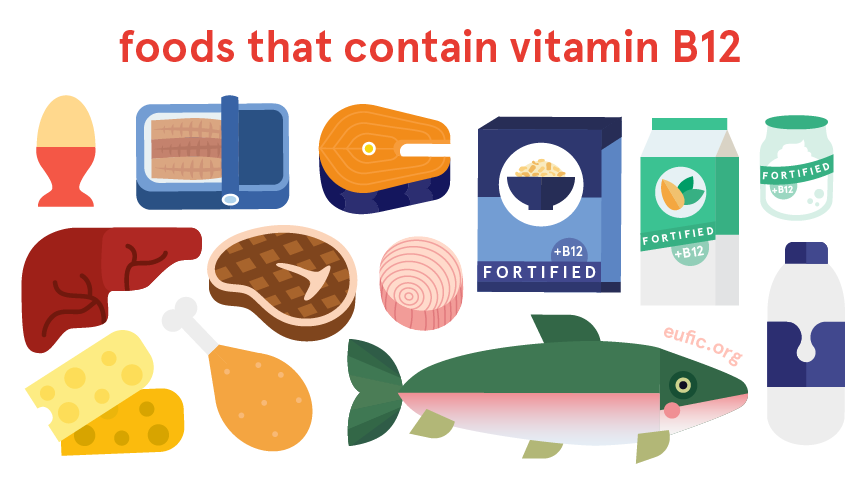
Does vitamin B12 interact with other nutrients?
Folate and vitamin B12 share many important tasks in the body, which support the healthy function of our cells and the nervous system. If we don’t get enough folate or vitamin B12 for a long period, their common functions become compromised and our health ca be affected in the long-term.
What happens if I have too little vitamin B12?
Vitamin B12 deficiency is not common in people who have a balanced and varied diet; however, it can happen to vegetarians and vegans, as they have limited sources of this vitamin in their diet. It can also be caused by specific health conditions that affect the absorption or use of this vitamin in our bodies, such as pernicious anaemia.
Vitamin B12 deficiency can lead to megaloblastic anaemia, a disease that causes our bodies to form unusually large red blood cells in lower amounts. The few misshaped red blood cells then have difficulties delivering enough oxygen around the body, leading to constant fatigue and shortness of breath. This condition can also be caused by folate deficiency.
On the long-term, vitamin B12 can also harm the normal function of our nervous system and lead to irritability, memory disturbances, depression, and disorientation. In advanced stages of severe deficiencies, symptoms can be more serious and irreversible.
What happens if I have too much vitamin B12?
It is very unlikely to get harmful amounts of vitamin B12 through foods alone. Even if we exceed our daily needs, our bodies remove the vitamin B12 surplus through urine.
Before taking vitamin B12 supplements, check with your doctor or a registered dietitian/nutritionist or consult your national dietary guidelines.
When should I pay extra attention to a vitamin B12 deficiency?
People who rarely eat animal products in their diets need to pay attention to their vitamin B12 intake since this vitamin is mainly found in animal products. If that’s the case, pay attention to food labels and look for foods fortified with vitamin B12, such as breakfast cereals and plant-based alternatives to yogurt and milk. If necessary, check your national dietary guidelines or get professional advice on the need to add a vitamin B12 supplement to your diet.
Older adults also need to pay attention to vitamin B12 deficiency since they are more prone to having stomach diseases or using medications that lower the absorption of this vitamin from foods.
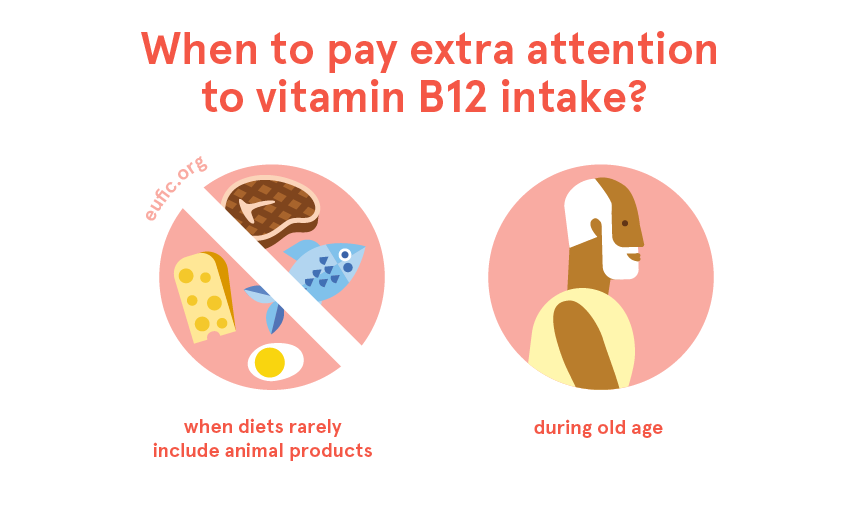
References
- European Food Safety Authority. 2015. Scientific Opinion on Dietary Reference Values for cobalamin (vitamin B12). EFSA Journal 2015;13(7):4150
- World Health Organization (WHO). 2004. Vitamin and mineral requirements in human nutrition. 2nd edition. Geneva, Switzerland: WHO.
- Public Health England. 2019. McCance and Widdowson’s Composition of Foods Integrated Dataset.
